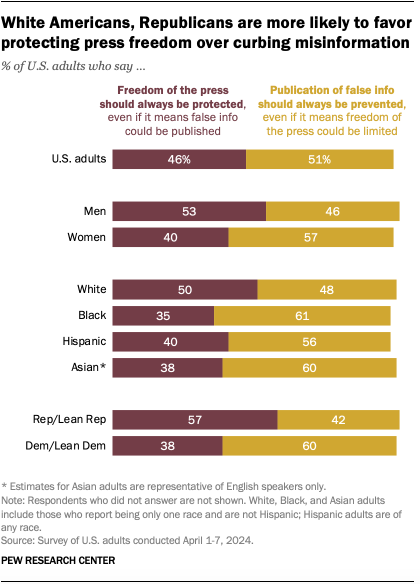☀️ Happy Thursday! The Briefing is your guide to the world of news and information. Sign up here!
In today’s email:
- Featured story: Should Big Tech credit the news sources it uses in AI?
- New from Pew Research Center: How Americans view technology companies
- In other news: A look at Columbia University’s radio station during the student protests
- Looking ahead: EU officials to investigate Meta over disinformation concerns
- Chart of the week: Protecting press freedom versus preventing false information
🔥 Featured story
This week, several newspapers controlled by Alden Global Capital filed a lawsuit against Microsoft and OpenAI for allegedly using millions of copyrighted articles without permission to train their AI chatbots. Another recently announced app, Rio, plans to use AI to aggregate news headlines into a daily news briefing – but only with news articles that it has explicit consent to use.
A Pew Research Center survey from earlier this year found that 54% of Americans say AI programs that generate text and images need to credit sources they rely on to produce their responses, compared with just 14% who say the programs don’t need to credit sources. About a third of Americans (32%) say they are not sure.
🚨 New from Pew Research Center
Most Americans are wary of social media’s role in politics and its overall impact on the country, and these concerns are ticking up among Democrats, according to a new Pew Research Center survey. Still, Republicans stand out on several measures, with majorities believing major technology companies are biased toward liberals.
Key findings include:
- Since 2020, more Americans believe social media companies wield too much political power.
- Most Americans think social media sites actively censor political viewpoints they disagree with.
- Overall, Americans are more likely to think Big Tech companies support the views of liberals over conservatives than the other way around.
- Americans favor more rather than less regulation of Big Tech companies.
📌 In other news
- Columbia University’s radio station becomes an essential news source during the student protests
- How a NYC museum used Black newspaper archives for its latest exhibit
- China tightens internet rules requiring social media giants to monitor sensitive posts
- A look back at the first abolitionist newspaper in America
- Political parties in India are spending millions on AI-generated election content
- A true crime podcast’s success reflects the evolving journalism landscape
- Republic of Georgia’s controversial media law sparks massive protests
📅 Looking ahead
European Union officials are set to investigate Meta over concerns that the company has not done enough to combat disinformation on the platform ahead of upcoming elections. Concern over Russian interference in EU elections is one of the key factors in the investigation.
In the U.S., six-in-ten Americans said in 2020 that made-up news and information that was intended to mislead the public had a “major impact” on the presidential election that year, according to a Pew Research Center study. And about half (48%) said the same about social media companies’ decisions on election content on their platforms.
📊 Chart of the week
The chart of the week comes from our new analysis on views of press freedom in the U.S. While Americans largely value the concept of press freedom, they are more evenly divided when it comes to the tension between protecting a free press and preventing the spread of false information. Certain groups are more likely to say press freedom should always be protected, including men, White Americans and Republicans.

👋 That’s all for this week.
The Briefing is compiled by Pew Research Center staff, including Naomi Forman-Katz, Jacob Liedke, Sarah Naseer, Christopher St. Aubin, Luxuan Wang and Emily Tomasik. It is edited by Katerina Eva Matsa, Michael Lipka and Mark Jurkowitz, and copy edited by Rebecca Leppert.
Do you like this newsletter? Email us at journalism@pewresearch.org or fill out this two-question survey to tell us what you think.